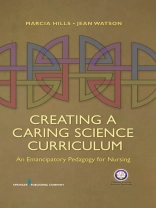The hallmark text for nursing faculty seeking to promote the transformative teaching of caring science, this book reflects the paramount scholarship of caring science educators. The volume intertwines visionary thinking with blueprints, living exemplars, and dynamic directions for the application of fundamental principles. It features emancipatory teaching/learning scholarship, and student/teacher, relation/evaluation models for adoption into education and practice regimens.
Divided into five units, the text addresses the history of the caring curriculum revolution and its reemergence as a powerful presence within nursing. Unit II introduces intellectual and strategic blueprints for caring-based education, including action-oriented approaches for faculty-student relations, teaching/learning skills, emancipatory pedagogical practices, critical-reflective-creative approaches to evolving human consciousness, and power relation dynamics. The third unit addresses curriculum structure and design, the evolution of a caring-based college of nursing, the philosophy of caring-human science, caring in advanced practice education, caring as a pedagogical approach to nursing education, and teaching-learning professional caring based on Watson’s theory of human caring. Unit IV explores an alternative approach to evaluation. The final unit explores the future of the caring science curriculum as a way of emancipating the human spirit, with caritas nursing as a transformative model.
Key Features:- Expands upon the premiere resource for maximizing caring science in education, research, and practice (Bevis and Watson’s Toward a Caring Curriculum: A New Pedagogy for Nursing, 1989)
- Provides a broad application of caring science for graduate educators, students, and nursing leaders
- Features case studies from two leading U.S. and Canadian universities
- Distills the expertise of world-renowned scholars
- Includes reflexive exercises to maximize student engagement
表中的内容
‘
Contributors
Foreword
Preface
Acknowledgments
UNIT I. FOUNDATIONS OF A CARING SCIENCE CURRICULUM
1.Caring Science: Curriculum Revolutions and Detours Along the Way2.Beliefs and Assumptions: The Hidden Drivers of Curriculum Development
UNIT II. AN EMANCIPATORY RELATIONAL PEDAGOGY FOR CARING SCIENCE CURRICULA
3.Emancipatory Pedagogy: The Transformation of Consciousness Through Relational Inquiry4.Creating Caring Relationships: Collaboration, Power, and Participation
5.Engaging in Critical Caring Dialogue
6.Critical Reflection-in-Action (Praxis): Emancipatory Action
7.Creating a Culture of Caring
UNIT III. CREATING A CARING SCIENCE CURRICULUM
8.Curriculum Structure and Design9.Evolution of a Caring-Based College of Nursing
10.Caring-Human Science Philosophy in Nursing Education: Beyond the Curriculum Revolution
11.Caring in Advance Practice Education: A New View of the Future
12.Introduction to Caring as a Pedagogical Approach to Nursing Education
13.Teaching-Learning Professional Caring Based on Jean Watson’s Theory of Human Caring
UNIT IV. BEYOND EVALUATION TO AUTHENTICATION
14.Connoisseurship: An Alternative Approach to EvaluationUNIT V. ENSURING THE FUTURE OF NURSING: EMBRACING CARING SCIENCE
15.Reflecting and Re-visioning: Bringing the Heart and Mind Together Index‘
关于作者
Marcia Hills, RN, Ph D, FAAN, FCAN, is Professor, School of Nursing, Faculty of Human and Social Development, University of Victoria, British Columbia, Canada. Dr. Hills is a distinguished scholar of Caring Science, faculty associate, inaugural chair of the Faculty Executive and Faculty Council, and academic lead of the doctoral program at the Watson Caring Science Institute (WSCI).












